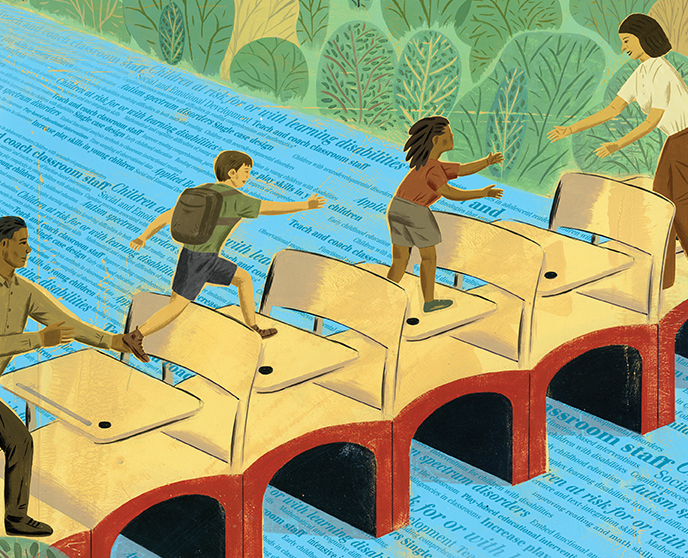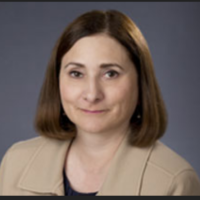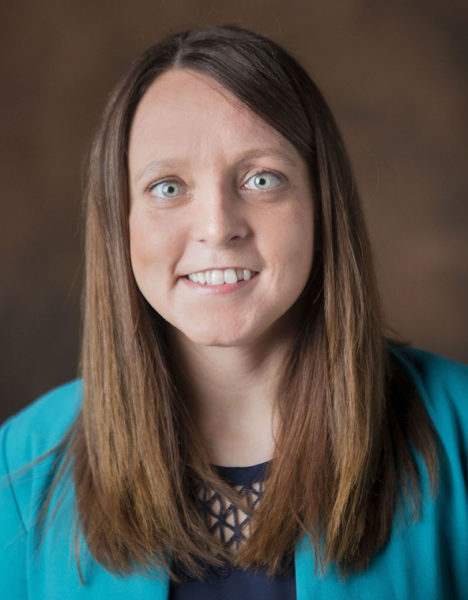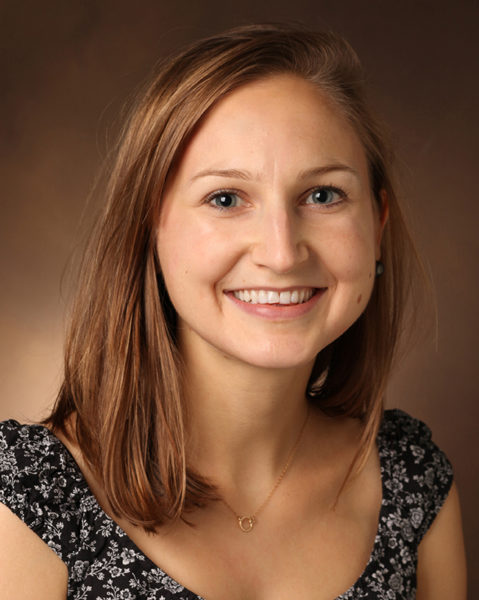
by Jennifer Plant Johnston
Finding the best ways to support people with disabilities, and the people who work with them, defines the culture of Peabody’s Department of Special Education. In recent years a cadre of energetic, productive faculty members have joined the department, building on the legacy of high-caliber research and teaching that began in the 1950s with Lloyd Dunn and developmental psychologists Nicholas Hobbs and Susan Gray.
High standards for faculty hires have helped the department maintain its top-tier reputation and attract a strong cohort of graduate students and federal funding, says Associate Professor of Special Education Joe Wehby, MEd’87, PhD’90, who chairs the department.
“Our teaching and research are quite integrated, making this a really good milieu for training,” he says. Graduates from Peabody’s special education program go on to work in a variety of settings, from schools and child-care centers to hospitals and clinics.
Consistently ranked No. 1 among special education programs nationwide by U.S. News and World Report, Peabody’s special education department is one of the few to offer programs in intensive interventions to undergraduate, graduate and professional students.
In summer and fall of 2019, the department’s researchers received $19 million in grants from the U.S. Department of Education, the U.S. Department of Health and Human Services, and the National Institutes of Health. Because a hefty portion of that funding supports graduate-student training, M.Ed. students have the opportunity to collaborate directly with faculty members and doctoral students on applied research, learning analytical and leadership skills. The practical focus of the second year includes student teaching in districts in and around Nashville and beyond.
The importance of these grants and the research and training they support has been magnified in an atmosphere where training future teachers, future administrators, future policymakers and future professors in special education has reached a critical nexus due to nationwide shortages of qualified professionals.
‘Question Everything’
“It’s a two-way street,” says Professor of Special Education Marcia Barnes, who came to Vanderbilt two years ago via the University of Texas at Austin. “Our strong students keep us on our toes and move us forward. There’s nothing more exciting or more invigorating for an academic than to have really strong master’s and doctoral students working with you.

Barnes’ research team develops intensive interventions in both mathematics and reading. In younger children who experience difficulties in mathematics, she searches for ways to address both math difficulties and cognitive difficulties, such as low attention skills, that can impede learning.
Her interest in ameliorating complex and overlapping issues is characteristic of many in the department. Barnes predicts future projects increasingly will acknowledge the occurrence and source of these overlaps and develop interventions to improve outcomes for children with complex learning and behavioral needs.
Her graduate student advisee, Salome D’sa, who has relatives in Canada, bumped into Canadian-born Barnes on a return flight to Nashville after winter break. They wound up seated next to each other, discussing D’sa’s spring semester research project to assess teacher vs. computer-led reading interventions for middle school students. D’sa also has participated in research seeking to evaluate how students with math disabilities process math word problems.
A longing for more specialized training led D’sa to Peabody from her native India. She graduated from St. Xavier’s College in Mumbai with a degree in management and marketing. “I found I didn’t love advertising and did a complete 180,” she says.
D’sa gravitated toward teaching, spending four years at Gateway School of Mumbai creating individualized plans for children with special needs. Her work experience in the lab school gave her a longing to expand her knowledge base.
“I was most keen on coming to Peabody because the faculty and the kind of research they do help you question everything. It’s been eye opening.”
Lauren Pittman, MEd’19, returned for her master’s degree after 10 years in the classroom out of a desire to connect her real-world experience in special education with the latest scholarship in the field. She is now back in the classroom full time at an elementary school in Canton, Georgia, but continues to collaborate with Barnes.
Peabody faculty members such as Barnes “really helped me tap into a love of research I didn’t know I had,” says Pittman. “Now I have a very full toolbox and want to share what I know” with others in the special education field in Georgia.
Tailored to Individuals
One of the most beneficial partnerships for the Department of Special Education’s faculty and students has been the long and productive research relationship with the Susan Gray School, says Assistant Professor of Special Education Jennifer Ledford, PhD’12.

The nation’s first nationally recognized preschool serving children with developmental disabilities alongside typically developing children, the Susan Gray School is housed in the same building as the Vanderbilt Kennedy Center, where many special education faculty members have offices. The school provides onsite educator training and demonstrates best practices for early childhood special education.
Catherine Simpson, a master’s student from Richmond, Virginia, and Ledford’s advisee, is part of a collaborative project with the Susan Gray School that helps guide children to interact well with peers who have disabilities.
“The degree to which children with disabilities have meaningful social interactions with nondisabled peers depends in part on whether those peers have learned effective interaction strategies,” Ledford says. Typically developing children may not have those skills and need their own toolbox of strategies.
“Explicitly teaching children to do things like stay in proximity to, and persist in interactions with, other children can result in increased interactions and learning opportunities for children with and without disabilities,” Ledford explains.
Ledford’s area of specialty is single-case research, which is particularly beneficial when evaluating changes in behavior and assessing the effectiveness of interventions on individuals rather than groups. Her team develops effective research tools to tailor individual interventions.
Simpson says she was able to take what she learned from Ledford’s research and apply it in the classroom immediately during her student teaching. “Learning how to implement the prompting procedures correctly and how to embed trials and use that within teaching was really helpful,” she says.
Collaboration and Communication

A lot of exciting energy is pushing the education field in more research-based ways that will help us support children better,” says M.Ed. student Katie Copeland, who works on the research team of Blair Lloyd, MS’11, PhD’13, assistant professor of special education.
Copeland’s undergraduate political science studies at Marian University in Indianapolis got her interested in the intersection of policy and education, and an AmeriCorps stint post-graduation sparked her awareness of special education.
“The research-to-practice gap is big,” Copeland says. “We’re doing a lot of work to make things practical and useable for teachers.” Currently, she is involved with a project that seeks to improve classroom-based assessment methods for students with behavior issues.
Classroom teachers dealing with behavioral issues can feel isolated, says Lloyd. That’s why “communication and collaboration with other specialists” is critical to maximizing outcomes for children.
Lloyd and her students work directly with teachers and behavior analysts in Metropolitan Nashville and surrounding school districts to help guide them through assessment and intervention for students with challenging behavior. “If we can figure out when and why a student engages in challenging behavior, then we can develop an intervention tailored to meet the student’s needs,” says Lloyd.
Sunya Fareed, a 2017 graduate of Georgia Tech, is working with Lloyd to develop a battery of assessments to evaluate how medication impacts behavior. Already, Fareed has had the opportunity to take the lead as a clinical case manager designing interventions for a child with challenging behavior.
Fareed estimates she spends 20 hours per week on research, 10 in her internship, and about 12 hours per week in class. “You’re always going to be busy,” she says. But the variety of experiences helped her narrow down future career choices. Fareed anticipates returning to clinical practice, while Copeland sees herself in a classroom setting.
Master’s students benefit from both faculty and doctoral student mentorship, Lloyd says. “During the past several years, I’ve been struck by the close collaborative relationships that form between master’s and doctoral students in my research lab. We set high expectations for our graduate students, but there are also many built-in supports to help them succeed.”
Jennifer Plant Johnston is a Nashville-based freelance writer with more than 30 years of experience, many of them writing for Vanderbilt. She is the former executive director of the Vanderbilt Center for Nashville Studies.